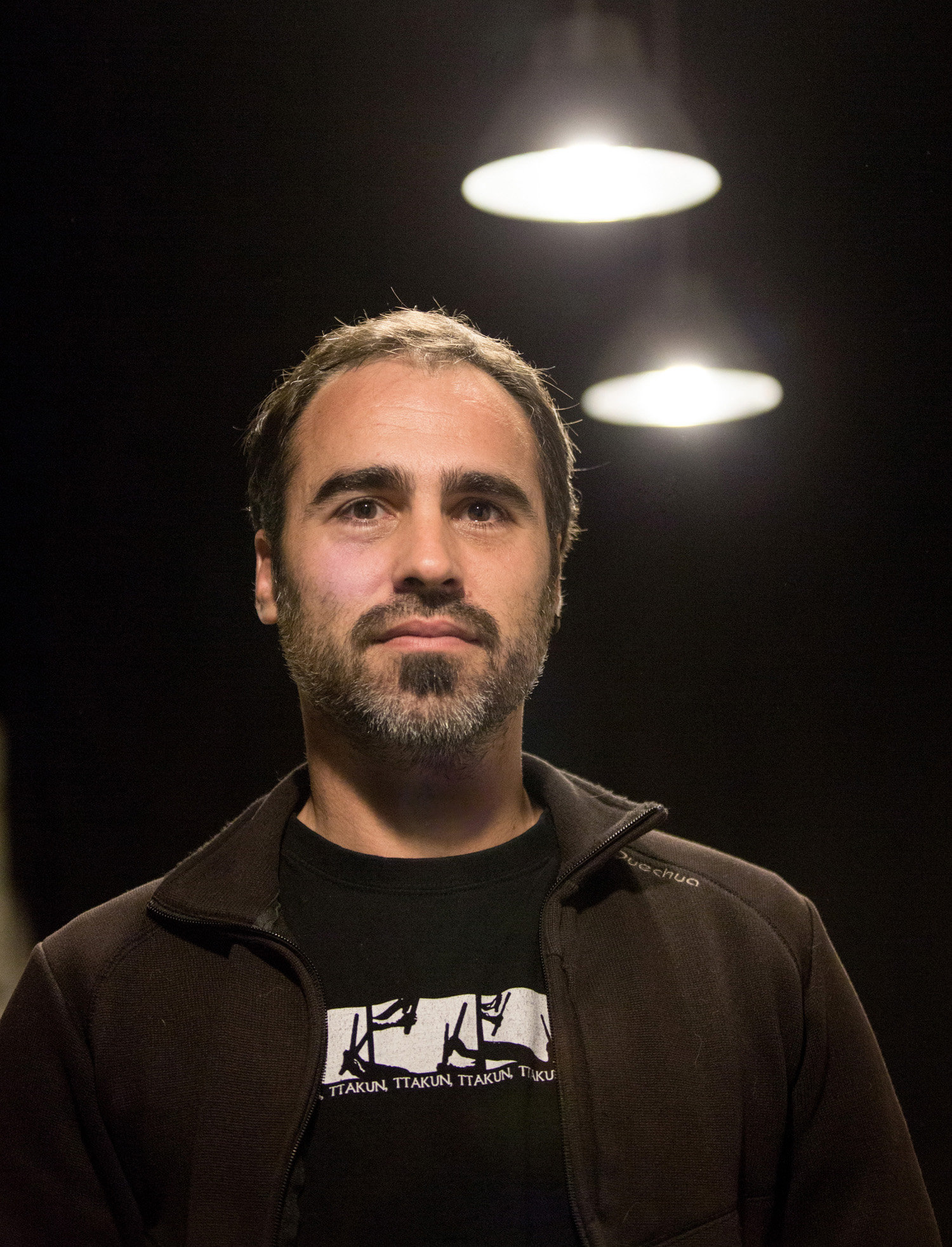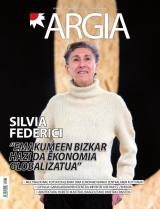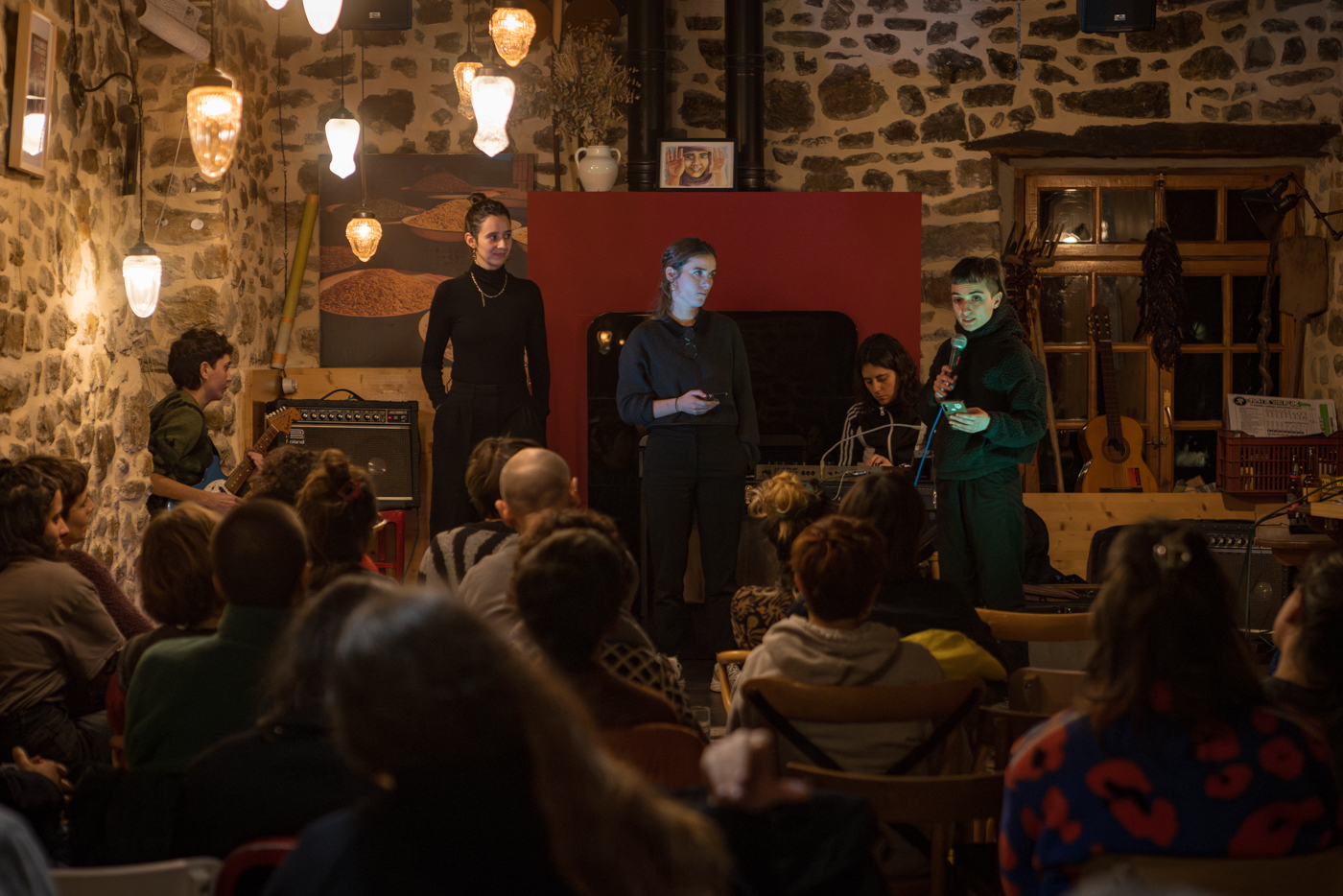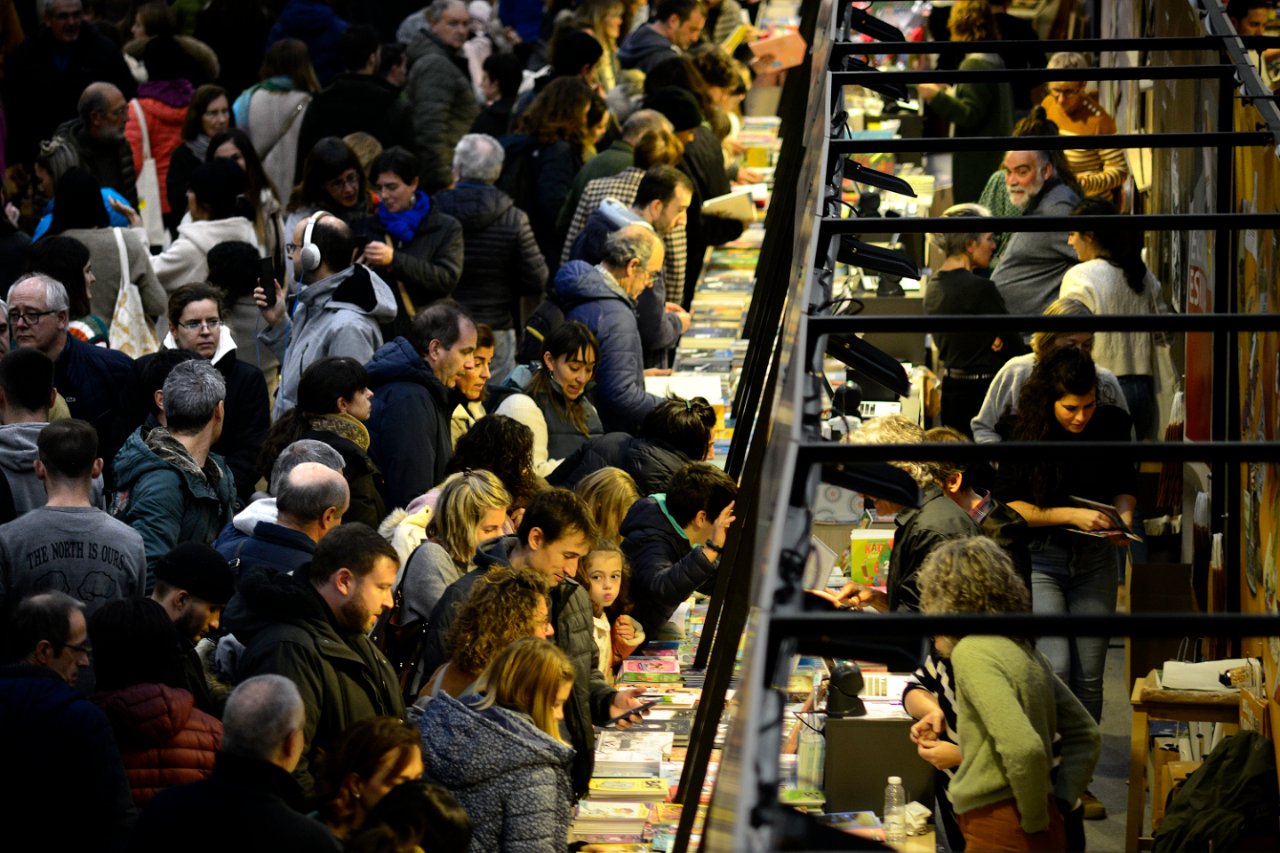"The aim of the system is not to reflect"
- Berango, 1978. Last year he received the Euskadi Trial Award in the Basque Country, Tartaroa. Pain, power and truth (Pamiela). Globalization and consumerism are the great yardsticks of the book. Later, he was awarded the Miguel Unamuno Prize of Misentropy for the best Spanish-speaking film. Although he has published seven essays, he is not particularly known in the world of Basque letters. He's a PhD in philosophy. He teaches this subject at the ikastola Ander Deuna in Sopela.

After receiving the Euskadi Prize, you said “I didn’t expect it at all, nobody knows me.” Well, the essential thing is the book, not the name of the author, right?
I do not know exactly if that is the case. I have a bad view of the awards. The world of Basque literature is living in a sort of endogamy, and jury members know who has written it, even if the work is anonymous. For example, I sent two texts to the Unamuno Prize, and a judge said to me: “Yes, and that other is yours, too.” Both in the literature and in the way we write, our business card is included. Even more so in the case of the Euskadi Prize, with books and well-known names, because I did not expect it, I thought Eduardo Apodaka was going to win.
Is it important to be awarded?
Being awarded has its good and bad side. Well, this interview with you. But above all, it has twice as much disadvantage. On the one hand, it puts you in the spotlight of criticism from others, you have to listen to what is not true. For example, a writer has just said that I am a propagandist, that I want to put up positions. I don't need to put up a job, because I'm perfectly in the place where I am. Don't spread to anyone, I'm a sniper. On the other hand, to the extent that I am not pleasurable, I have no desire to appear in the media, not even the need, because I will not live from books. I really like anonymity. Despite having published seven sessions, few of them knew me until they awarded me, other writers are absolutely media with little work.
The writer, and less the essayist, has no reputation for other more media trades.
Now that I'm entering the publishing world a little bit [Sorzain is one of the project's drivers], I'm becoming aware of market trends. A writer earns 10% of sales and mediation wins the rest, starting with the dealer with 50%. The imbalance is therefore enormous. Writers have become consumer issues. In proportion we are many more writers than readers, we do not have time to read the works of other writers. It seems that books are being read and disseminated through advertising. Tartar. The sale of Mina, power and truth was very scarce, but upon receiving the Euskadi Prize, suddenly much more has been sold.
Culture is, above all, a spectacle. The market commands. As a professor, how do you experience this situation?
Very bad. Every day I see how this world influences education. There is nothing else to do with how the subjects of philosophy and humanities have been discarded, and the LOMCE is the example of that. Before, the topic of Philosophy was mandatory in the second of Bachillerato, now only for those of letters and eligible. Obviously, the aim of the system is not to get them to think.
Greek
mythology has been Tartaroa's starting point for analyzing current, globalized and consumerist society.
I like myths, not just Greeks. Basques, Nordic or Celts as well. However, in the book, myths are not the basis, but the excuse for what I mean. In Basque mythology I found nothing related to what I wanted expresar.Quiza because Christianity transformed Basque myths. The Greek myths have also changed us, but the Greeks offered me two advantages: being well known to everyone and having a parallel with what I meant.
What is Tatar?
In Greek mythology there were three infernal fields, one of which was Tatar, where living and inanimate beings suffered together. This parallelism helps to understand one of the book's theses. Today we all suffer, before only the plain people, today we are all subjected to ecology, to fear, to vulnerability.
You have tried to combine the global world with the Basque reality.
In the previous essay I referred to hypermodernity or capitalism, and in the previous four, to Basque culture. I have turned a thousand times to the question “What is Basque?” and I have no answer. There are a lot of definitions, but I see a terrible mess. I don't think we have to give it a single definition. We strive to give a single definition: Euskaldun, Euskaldun, Euskaldun, Euskaldun, Euskaldun, Vascoa. We have to admit that there are many definitions. We should try to find the rhizomes of those definitions or seek their synergy, to go in a unitary way taking into account diversity. It's sterile to stick to a single definition.
The desert is another axis of the session.
Zygmunt Bauman popularized the term “liquid modernity.” We've gone from being a solid society to a liquid society. I say instead of liquid that we are arena.La image of the desert has been vital to me to carry out the session.
“The education system driven by oligarchy wants an abstract, depoliticized and vulgar human being”
What are your students like?
They are not referents of students. I teach class in a Uribe-Kosta ikastola, aged between 16 and 18 years in high school. Their families are in a very high socio-economic situation. We live the paradox of hypermodernity: we are made to believe that we are autonomous and free, but we are exactly the opposite. Therefore, students also think they are involved and mature, but, for example, when we discuss racism we realize that they are close to the messages of the far-right. Their discourse is contrary to machismo, but in practice they are lost. They live in a paradox. More than narcissists, according to Michel Maffesoli, are Homo Esteticus. They just think about "enjoying and enjoying." Enjoy the day, the rest don't care. When asked for a reflection, 80% used the same phrase: Carpe diem.
The education system doesn't help.
One characteristic of hypermodernity is the paradox. The first paradox among young people occurs in the first course of the Baccalaureate: “I hate philosophy because it makes me think. So far I haven’t done it,” they say. The education system does not guarantee autonomy, the business world is established and entrepreneurs sell us the education system as a panacea.
In the globalized desert, the lighthouse is the Internet. How do you live on the internet in school?
Some teachers prohibit mobile access. Although it’s dangerous to me, when I’m explaining something, I find it interesting to hear “you’ve been wrong with it.” According to pedagogue José Antonio Marina, the internet and intermediate devices are neutral. It's like a hammer, you can break a head, but it also serves me to build a house.
Youth is not a model, nor is the political class.
Politicians have become a reputation model. In recent decades, politics has fallen dramatically. We can Ahal Dugu is a populist phenomenon, populism has unleashed, in part, a group of people who were asleep. In politics, I am skeptical, I am pessimistic, I have no confidence in the parties. What they promise and then what they deliver don't match, or very rarely. I demand politics to the extent that it can be organized outside partisanship, through popular movements, in its path you can sow the seed of change. But popular movements don't have the vitality of the 1960s, 70s or 80s, with the exception of red-hot feminism. Among young people, in general, there is no passion for politics, as long as they have the opportunity to consume they do not want to move.
“All political parties are calling for democracy and freedom, those empty and nice words of all time. How can extreme
right-wing and left-wing parties make the same cry?”
It is often said that the origin of a new political culture lies in education.
But as long as education is in the hands of the political class, how do you do it? In the Western system, education is designed to produce the worker that the company needs. Because of the latest technologies, many jobs will either disappear or be transformed. We're going to be replaced with drones and devices. Companies are changing and the working class is changing too, although for that they have had to change the education system. Without a competency-based pedagogy we will hardly create a new political culture.
The believer seeking “a new God” is alive.
According to Nietzsche, the death of God would bring the shadows of God. God's alternates, the sciences, politics and consumerism, are in force. There are so many gods where, in that hypermodernity, whoever is thirsty for faith can choose the god he wants. The education system driven by oligarchy wants an abstract, depoliticized and vulgar human being. The system addresses its needs. As long as there's bread and circuses, you don't have to stand up against anything.
Democratisation and strong homogenisation are taking place.
The word democracy has become a euphemism, it is no use at all. All political parties are calling for democracy and freedom, those empty and nice words of all time. How can extreme right-wing and left-wing parties make the same cry? Words, definitions, they are useless, definitions have become nothing. Democracy is nothing.
How do you overcome that?
Hardly, seeing the Trump phenomenon... That can make the right flourish in Europe. What can come to us? My dream is to end capitalism, but is it possible? Change is necessary, but it will not come from the people, but from a cataclysm or from the very implosion of capitalism. Joseba Gabilondo states in her last book that “this growth is going to overwhelm the world, there is no welfare state for everyone, it is impossible.” Thus, the middle class will disappear, economic inequalities will grow even more, and the so-called “third world” will be lifted. More and more people are being fucked. I do not expect anything good.
Sorzain argitaletxeak irekia izan nahi du. Erabakitzeko eskubidea, botere eragilea (egile askoren artean) eta Pott Banda. Ekilisbrista bihotza (Jon Kortazar) dira bere lehen bi argitalpenak. Mitxelko Uranga da proiektuaren eragileetako bat: “Sorzain izaki mitologikoa da. Sorgin gaizto bat ei zen, umeak jaio zain egoten zena haiek akabatzeko. Guk, ostera, sorzainek umeen ibilbidea zaintzen zutela pentsatzen dugu. Gure kasuan umeak liburuak dira.
Agitaletxe txikiak ixten ari dira, nagusiak ez dira aise bizi. Saiakera ez ote den behar bezala argitaratzen ipini dugu auzitan: “Sorzain sortzean ez dugu adierazi nahi orain arte pentsamendua edota saioa ez dela zabaltzen behar bezala, ezta guk formula berria asmatu dugunik ere. Baina, egiari zor, beste argitaletxeek argitaratzen dutena ez da hainbeste irakurtzen. Azken urteetan saiakera pilo idatzi da eta zenbat irakurri diren aztertzen badugu, oso gutxi dira. Saiakerak ez dira irakurlearengana heltzen, ez dira irakurtzen. Idazten dugunok irakurtzen diogu elkarri. Eta hori ere, egiten den arabera, oso gutxi. Pamielak asmatu du Upaingoa sailarekin. Sailaren arrakasta da, ziur aski, saio laburrak direlako. Hori da nolabait gure asmoa. Saiakerak akademikoa izan beharrean laburra eta arina behar du”.
Irakurle berririk ba ote?: ”Guk gazteria ‘bezero’ potentzial ikusten dugu. Ikasleei zer-nolako egoera bizitzera irits gaitezkeen argitzen zaienean, kezkatzen dira . ‘Baina zer egin daiteke?’, galdetzen dute. Badituzte beren kezkak. Gure ustez, liburua euren bidea bilatzen laguntzeko ‘gailua’ izan daiteke. Jendartearen aldaketa horren bidez baino ez dugu ikusten. Sorzain-en helburua kultur eragile izatea da, batez ere, eragile politikoa izatea, ez ideologia markatu batekin, baina bai herri mugimendua aktibatzeko moduko politika eragiteko belaunaldi berrietan”.
Arriskatu behar da beraz?: “Bai, eromen puntu bat behar dugu. Argitaletxeak enpresa dira, gu kolektibo bat gara, eta dena musu-truk egiten dugu. Etekin ekonomikorik atera behar ez dugunez, bestelako lasaitasunez heldu diogu ekimenari”.
Joan Tartas (Sohüta, 1610 - date of unknown death) is not one of the most famous writers in the history of our letters and yet we discover good things in this “mendre piece” whose title, let us admit it from the beginning, is probably not the most commercial of the titles... [+]

















ilbeltza-(1).jpg)





